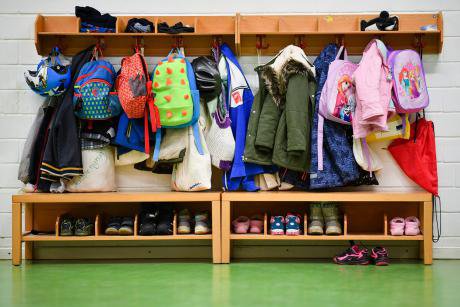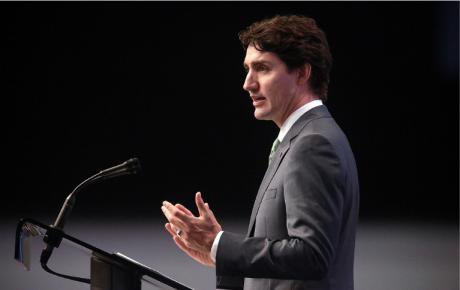
Children's jackets. Photo: Uwe Anspach/DPA/PA Images. All rights reserved.My son’s first favourite colour was pink. He loved pink flowers, eating with pink spoons and playing with pink cars. But it wasn’t long before social norms steered him towards other colours, more ‘appropriate’ for boys.
More recently, he’s talked about how his younger sister cannot do certain activities simply “because she’s a girl.” My son is five years old, and my daughter is two.
How do I respond to this? Sometimes, my own internalised sense of what it means to be male, and what it should mean to be female, gets in the way. Mental barriers occasionally raise their ugly heads to prevent me from fully embracing the truly fluid nature of gender.
Mental barriers occasionally raise their ugly heads to prevent me from fully embracing the truly fluid nature of gender.
Lingering and very potent social pressures also counter any feminist perspective I attempt to ingrain in my son. Both of us learned that pink is ‘a girl’s colour’, and that there is ‘a girl’s way’ of fighting and playing. Both of us learned that boys don’t cry.
When I tell people that I am trying to counter such pressures, by engaging in what I hope to be transformative dialogue with my son, I am met with different responses. Some are supportive and share similar challenges in their lives. Others roll their eyes and laugh. Or, they say I’m doing my son a disservice by not teaching him to ‘toughen up’.
We may be living in a feminist-leaning era – with some leaders like Canadian prime minister Justin Trudeau proudly calling themselves feminists. But society in the US, as in many parts of the world, has not yet reached a tipping point.

Justin Trudeau. Photo: Rouelle Umali/Xinhua News Agency/PA Images. All rights reserved.Feminism is still seen as a protest, a dividing line in the political landscape – or a sound bite. Many boys and men are reluctant to define themselves as feminists, and even fewer are willing to put a cog in the patriarchal machine.
It may be a very long time before feminism shifts from being one of those divisive “isms” to an accepted and cherished norm. And while I consider myself an optimist, the historically cyclical backlash against feminism leaves more doubt than promise.
Feminism is still seen as a protest, a dividing line in the political landscape – or a sound bite.
Looking ahead to 2030, my son and daughter will be 18 and 15 years old, respectively. This is the year that the United Nations has set – through its Sustainable Development Goals – to “achieve gender equality and empower all women and girls.”
But the UN itself has yet to fund gender programs sufficiently or even lay the groundwork needed to achieve gender equality by 2030. It’s 2017, and gender gaps and pay gaps persist in the workforce worldwide, in spite of laws aimed to narrow them.
Public figures like Harvey Weinstein have normalised violence and the objectification of women. Allegations of sexual harassment steadily mount, and while the #MeToo campaign surges, we face sobering realities.
Data suggest that 18% of women in the US have been raped. Globally, the World Health Organisation says that 35% of women – one out of every three – experience physical or sexual violence in their lifetime.
So what does it mean to be a feminist parent in this context, where disheartening statistics and systemic barriers cast a long shadow over our chances of achieving gender equality anytime soon?

Girls climbing. Photo: Jorg Carstensen/DPA/PA Images. All rights reserved.We need a concerted effort – at all levels of society – to break the cycle of gender inequality. Verbal commitments must be linked to accountability. We need a level playing field, with access to resources and opportunities guaranteed for all.
Both personal and social attitudes must change – through mindfulness and legislation – to recognise and redress deep-rooted and often unconscious biases.
This is not about men saving the day or “allowing” women their moment. It’s about knowing how to speak out and stand up against injustices – and when to sit down and let others speak for themselves.
This is not about men saving the day or “allowing” women their moment.
It’s about businesses going beyond boosting the overall number of women in the workforce, to paying and promoting them equally. It’s about moving past archaic “men are good leaders” ideas and voting more women into legislative bodies like the US congress – which is predominantly made up of white males.
We must expect resistance to such changes. As women’s movements grow, it will feel like men are losing ground – which is true, given the pervasiveness of male privilege.
White women may also feel like they are losing ground as women of colour make gains – and as transgender women do, and so on, as the intersections and cross-sections of society converge on a single plain. This is the price we must pay for true partnership and community.
As I look at my children, I know that both of them can play a role in catalysing change, propelling us to that feminist tipping point. They must both take on active roles in this movement – and it won’t be easy.
It will require checking, leveraging or relinquishing the privileges afforded them in the interest of equity. My son must embrace the idea of going against the grain and not expect his sister to do the heavy lifting.
As we look towards a more feminist future, large-scale social change is essential. But it’s also about the everyday interactions between a father and son – where we ask why pink can’t be a boy’s colour, or why white men are paid more than everyone else.
It’s about accepting “no” for an answer and holding each other accountable. It’s about asking those questions, engaging in sometimes uncomfortable conversations, and taking the necessary steps, on both an individual and societal level, to tip the scales.
Read more
Get our weekly email
Comments
We encourage anyone to comment, please consult the oD commenting guidelines if you have any questions.